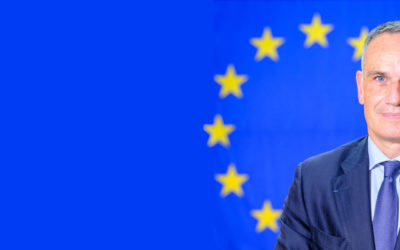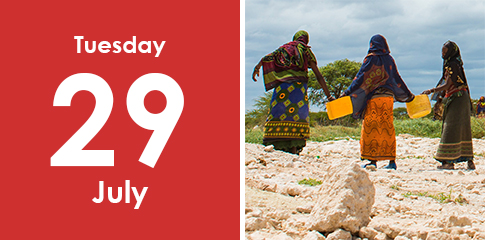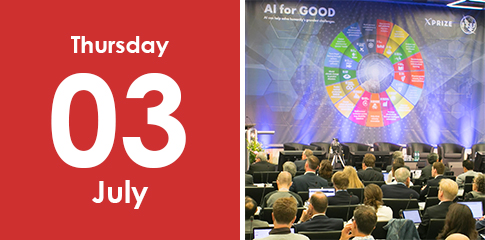24 April marks the “International Day of Multilateralism and Diplomacy for Peace”. This year, the day takes a special significance: we mark a centenary since the establishment of the League of Nations and 75 years since the establishment of the United Nations (UN). Most importantly, multilateralism is put to a new test as the world is hit by the COVID-19 pandemic.
“Humankind is now facing a global crisis. Perhaps the biggest crisis of our generation (…). When choosing between alternatives, we should ask ourselves not only how to overcome the immediate threat, but also what kind of world we will inhabit once the storm passes.” Yuval Noah Harari
At this juncture, there is an opportunity to rethink the format of international negotiations themselves, to contribute to defining the kind of world we want to inhabit and leave to the next generations. Could we experiment with a truly inclusive negotiation to lay the foundations of the world after COVID-19, bringing to a virtual negotiation table people from all continents and walks of life? Could we bring to negotiate together those willing to turn the global threat into an opportunity to address other global challenges such as climate change, while others may be tempted to go back to “business as usual”?
State-driven international negotiations
“La posición sostenida por el representante de la UE me ha indignado. (…) Como parlamentaria elegida democráticamente por la ciudadanía europea, le pido que a partir de ahora mantenga una posición constructiva y positiva en este proceso. Si no, me veré obligada a decirle: USTED NO NOS REPRESENTA.” These were the words of a member of the European Parliament looking into my eyes as I was seated behind the European Union nameplate in the UN Human Rights Council Intergovernmental Working Group on transnational corporations and other business enterprises with respect to human rights. This was followed by a round of applause from civil society representatives likely outnumbering the number of State representatives in Room XX of the Palais des Nations in Geneva.
This and other instances raise profound questions on the current set up for multilateral negotiations. With a few notable exceptions such as the International Labour Organisation where workers and employers have an equal voice with governments, seats at the global negotiation table are exclusively reserved for States or groups of States – all States have in principle an equal voice, but most negotiations are marked by an asymmetry of power. Well before the world was hit by COVID-19, one could hear, even within the ranks of diplomats and negotiators, questions like: do negotiating States or groups of States genuinely represent the collective interest of their “people”? Isn’t there a need to rethink the format of negotiations bringing a greater diversity of voices to the negotiation table and in the preparation for negotiations?
Admittedly, the multilateral system has considerably opened to non-State actors. Some 1,000 NGOs and international organizations have observer status at the UN. However, there is still fierce opposition, from some States but also from within civil society, towards bringing other actors, such as business organisations and companies, to the negotiation table. Moreover, as the name implies, observer status grants a limited role. It does not necessarily mean a seat at the negotiation table. In most, if not all negotiations, States ultimately negotiate, seal a negotiated agreement or agree to disagree in various deadlocked negotiations.
This comes in contrast with increasingly positive experiences outside the UN where spaces like the World Economic Forum enable business, governments, civil society and academia to interact; or promising initiatives such as the Mega-Sporting Events Platform which led to the establishment of a Centre for Sport and Human Rights by bringing together sport bodies, governments, broadcasters, business companies, trade-unions, NGOs and international organisations.
Multilateralism confronted with COVID-19
While the COVID-19 crisis comes with renewed calls for “global solidarity”, it remains to be seen whether the current multilateral system can respond effectively. If we leave it to States, some will use the crisis to further undermine multilateralism while others will strive for a multilateral response. Maybe the global conversation initiated by the UN Secretary General António Guterres will give the UN a new lease of life. Interestingly, while negotiations are at the heart of the multilateral system, the “Preliminary Assessment of the UN75 Survey and Dialogues” released on 20 April 2020 seems to make little mention of negotiation apart from the timeline which foresees that “Member States Commence UN75 Political Declaration Negotiations” in May 2020. If there was any possible doubt, States – and not other actors – will be at the negotiating table.
As travel bans and confinement measures make it impossible to convene international negotiations physically, we have witnessed a move towards virtual negotiations and discussions on digital platforms. However, technological solutions may not be enough to fix past shortcomings, as illustrated by recent examples.
As I watched on 9 April the first “virtual conversation” of the UN Human Rights Council with the High Commissioner for Human Rights, I was impressed by the technology, but much less so by the content despite the plea made by High Commissioner Michele Bachelet that, “We simply cannot return to where we were just a few months ago, before COVID-19”. Delivered behind a screen from a home or office, the successive statements by representatives of States or group of States seemed similar to what was heard before COVID-19. There were a couple of notable exceptions with visionary statements from the Ambassador of South Africa (“it is about us as human beings and how we interact with each other with respect and dignity”) or Bangladesh (“perhaps the only silver lining to the COVID-19 pandemic is what it might mean for the climate crisis”). This was followed by a few statements by NGOs, as if each actor were simply playing their ascribed role. The business community was notably absent. Overall, it appears that the well-established discussion and negotiation formats are inherently an obstacle for the much-needed innovation and creativity for the world after COVID-19. Could we build on the daily collective applause showing solidarity to front-line health workers and give them and other particularly exposed professions and groups a seat at the negotiation table?
“A world without international organisations as we know them now is not a pure fiction” Cedric Dupont
Another outstanding question on the effectiveness of multilateralism has to do with the impact of negotiations and negotiated agreements – the issue is addressed in more depth in an address delivered on the occasion of the World Negotiation Day. Apart from international organisations such as the World Trade Organisation where the negotiation of binding agreements comes with concrete means for enforcement, the lack of implementation has been a shortcoming in many other instances, whether the agreements are binding or not. Can we expect greater impact during and after the COVID-19 crisis? Thanks to technology, the community of States agreed from a distance to a UN General Assembly resolution on “Global solidarity to fight the coronavirus disease 2019 (COVID-19)”. It could be seen as a success if it had been followed through by all States. In its “Explanation of position”, the United States stated that addressing COVID-19 “requires global action, international solidarity, and unity of purpose”. Some will surely see a contradiction when the US President shortly after suspended US funding to the World Health Organisation, while others may openly or discretely question the effectiveness of the WHO and other international organisations.
Experimenting with an inclusive and virtual international negotiation
Against this background, the emerging International Negotiation Platform could offer an opportunity to experiment with a new format of international negotiation open to all, from officials of international organisations and governments, to business and civil society, and most importantly to all those who never had their voice heard in international negotiations. The power of negotiation techniques could lead us to draft a “Shared Humanity Charter” to guide our collective efforts and serve the greater good for the world after COVID-19.
This proposal comes with a number of challenges, and part of the experiment is to address them before the launch and draw lessons afterwards:
- Participation: if an affordable technology allows, the proposal would be to open the negotiation to all and mitigate the challenge for the many who do not have access to internet. It would also be instrumental to use artificial intelligence or other tools to allow for the use of multiple languages;
- Rules: participants could engage in a personal capacity to foster creativity and innovation, and undertake to respect rules maybe in a draft “Code of Conduct for International Negotiators” with insights to negotiation techniques;
- Modalities of engagement: while the easiest option would be to put forward a draft on the (virtual) negotiation table as is the case in most international negotiations, the experiment could start with a crowdsourcing allowing participants to: 1- outline their personal or institutional interests in the negotiation; 2- contribute with elements for a “Shared Humanity Charter” 3- identify barriers/levers that can hamper/contribute to impact on future negotiations or policy-making.
The negotiation would be timebound so that its outcome could ideally contribute to laying the foundations of the world we want to live in after COVID-19. Irrespective of the outcome on content, this experiment would contribute to rethinking the format of international negotiations in a context where the current crisis has demonstrated the pressing need to innovate for global cooperation.
By Jerome Bellion-Jourdan
Senior Fellow in Residence, Global Governance Centre
The Graduate Institute
This blog is informed by the ongoing process to test the idea a virtual and inclusive negotiation to lay the foundations of the world after COVID-19, led by Jerome Bellion-Jourdan and with pro bono contributions by individuals from international organisations, governments, business and civil society. It follows the “Exploratory talks” for an International Negotiation Platform convened by the Graduate Institute’s Global Governance Centre and Executive Education, which explored how to address three interconnected issues: rethinking the format of international negotiations; enhancing negotiation capabilities; refocusing negotiations towards the greater good. Reactions and contributions can be channelled in the “comment” box of the open survey for the International Negotiation Platform; posted on LinkedIn and/or sent to: jerome.bellion-jourdan@graduateinstitute.ch









0 Comments